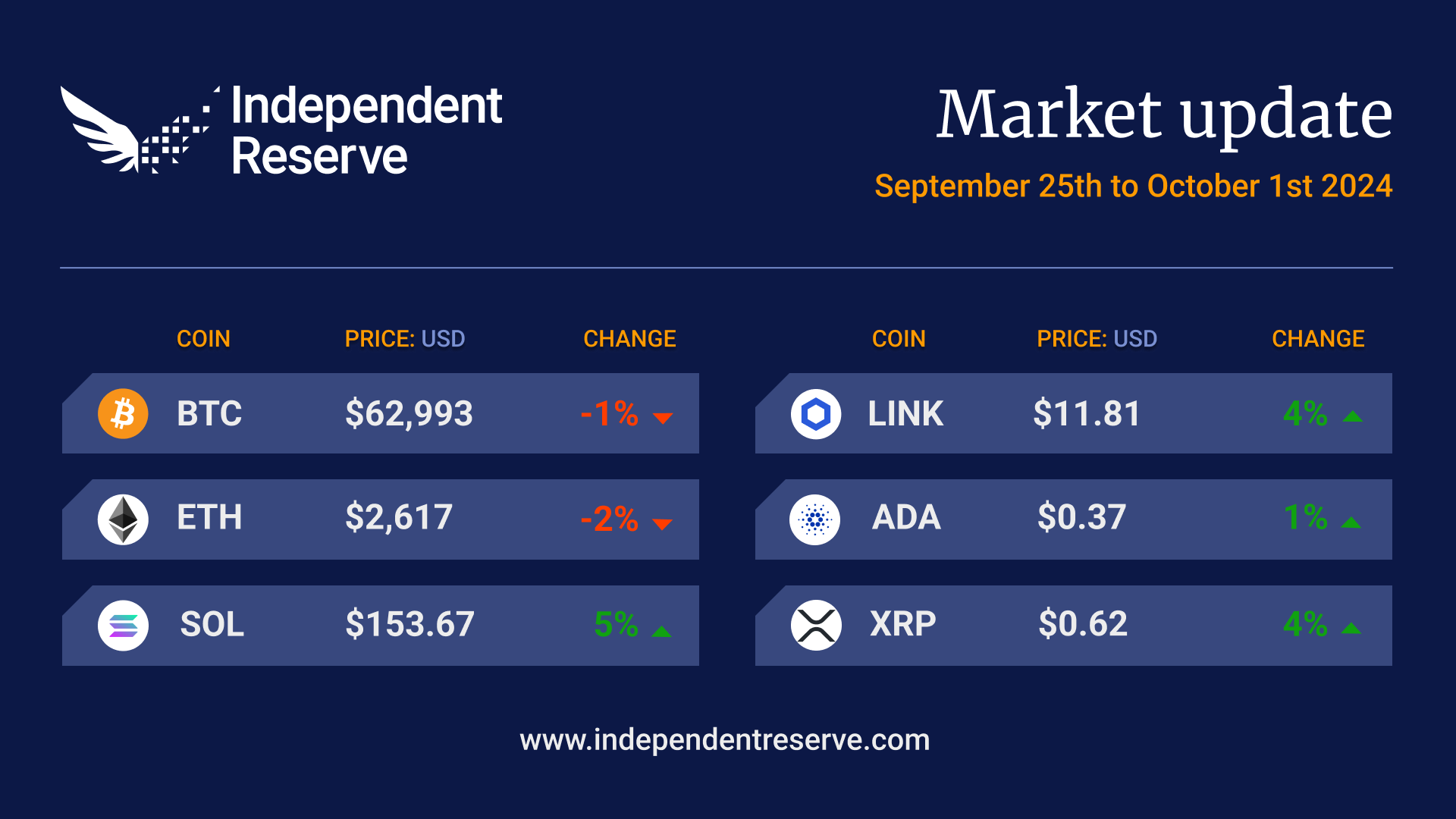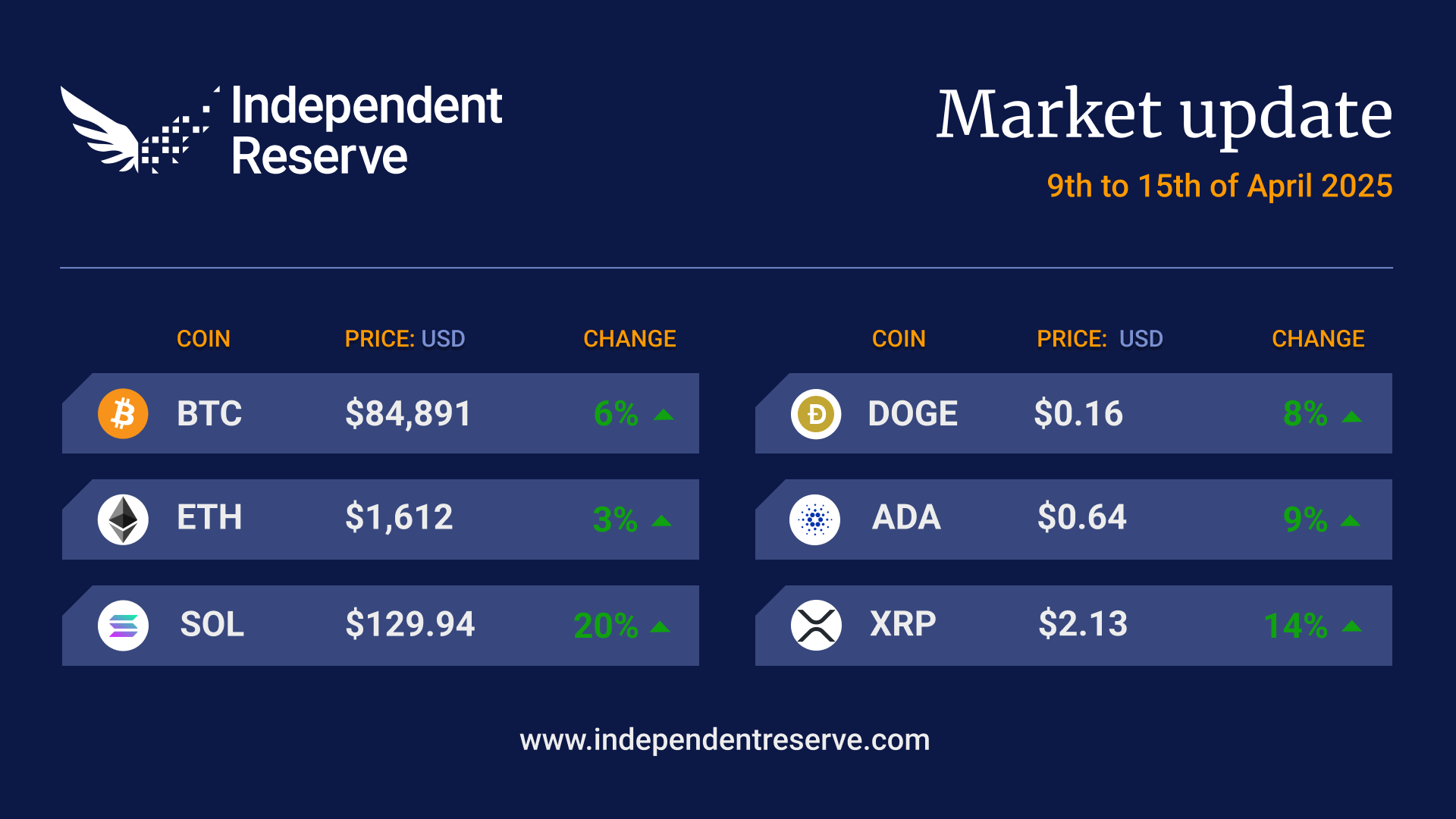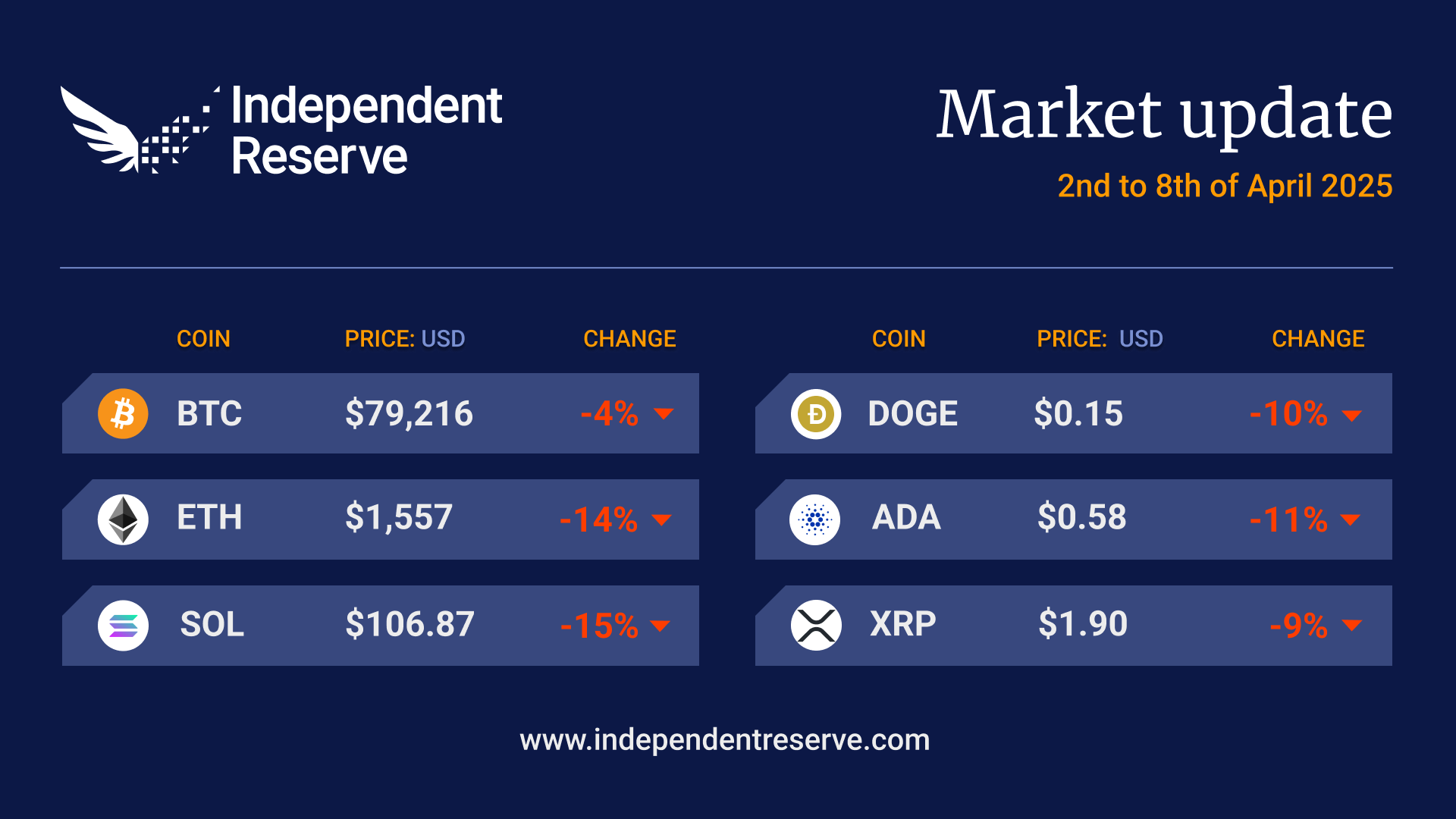In Markets
Bitcoin rose 6.9% last month, making it the best September in more than a decade (it usually averages a 3.44% loss.) While ‘Uptober’ usually averages a 22.9% return and November averages 46.8%, that’s far from guaranteed, and Bitcoin took a 4% dive on the final day of the month over concerns about a possible US slowdown, the pace of rate cuts, and the AI bubble popping. CoinDesk reports that options traders are positioning for more weakness until the US presidential election is over. However, China is embarking on a round of stimulus measures, which could drive crypto higher over the next year. Bitcoin finished the week down 1% at around A$91,560 (US$62,993), while Ethereum lost 2% to trade at around A$3,765 (US$2,617). Solana continues to perform with a 5% rise, and XRP gained 4%. Even Donald Trump posting DOGE memes couldn’t get Dogecoin above a 5% rise, but a new Japanese PM called Shigeru Ishiba propelled Shiba Inu to a 27% weekly gain. Cardano rose 1%. The Crypto Fear and Greed Index is at 50, or Neutral.

From the IR OTC Desk
United States
As we talked about last week, the U.S. Federal Reserve made a significant move by cutting interest rates by 50 basis points, bringing the Federal Funds rate to a range of 4.75%–5.00%. The forward market is currently predicting another 25 bps cut for the November decision, which should further buoy risk assets. This marks the beginning of an easing cycle in response to slowing economic growth, with unemployment rising and inflationary pressures easing. The rate cut aligns with similar moves by other G10 central banks as they navigate a weakening global economy. Markets are reacting cautiously, with equities showing mixed performance, while the dollar weakens against major currencies. This cut could spark more volatility in risk assets, including cryptocurrencies, as liquidity conditions change.
Australia
In contrast, the Reserve Bank of Australia (RBA) maintained its cash rate at 4.35%, signalling caution. While inflation has moderated, concerns about wage growth and high household debt levels persist. The RBA is holding firm for now, watching how inflation evolves and keeping a close eye on global developments, including U.S. monetary policy. Australian financial markets are expected to remain relatively stable, though any future moves by the U.S. could put pressure on the RBA to follow suit.
Singapore
Singapore’s economic landscape remains steady, with the Monetary Authority of Singapore (MAS) keeping its policy unchanged. Inflation is under control, and the financial sector, particularly in fintech and digital assets, is growing steadily.
Globally
Japan’s newly elected Prime Minister, Shigeru Ishiba, has introduced market volatility with his economic policies, particularly affecting the Nikkei 225, which dropped by over 2,000 points, and strengthening the yen against the U.S. dollar. His potential for tighter monetary policy and tax reforms, along with a more independent stance for the Bank of Japan, have raised concerns about corporate profits, particularly for export-reliant industries. This has caused risk assets like cryptocurrencies to sell off circa 5% (so far!) over the last couple of days.
OTC desk
On the desk we have seen heavy unidirectional selling of stable coins this week. Surprisingly, Tether has maintained a position above the peg, but finally succumbed late yesterday and now hovers around three to four pips under. Flows otherwise have picked up, with everyone making their way home from TOKEN2049 and getting on the tools again. ETH/BTC continues its recovery, and despite the Japan-led dump, we remain cautiously optimistic.
For any further information, please feel free to reach out.
In Headlines
Bitcoin and Ethereum ETFs spin up
The Bitcoin and Ethereum ETFs came roaring back to life last week. The BTC ETFs hauled in US$1.1 billion (A$1.6B) in net inflows, the most in a week since mid-July. On Friday, Grayscale saw a net inflow of US$26.2M (A$37.9M). And, after six depressing weeks of net outflows, the Ethereum ETFs took in US$84.5 million (A$122.1M) for the week. BlackRock’s ETHA fund has topped US$1B (A$1.4B), putting it in the top 20% of all 3,700 ETFs available in the US, and Grayscale’s Ethereum Mini Trust is also over $1B.
Strengthened consumer protections for crypto investors in Singapore
Starting October 4, digital asset firms licensed in Singapore will be required to comply with enhanced regulations focused on ring-fencing customer assets, risk management, and firm disclosures. These measures, aimed at safeguarding retail investors, will roll out in two phases, with additional rules on risk awareness assessments taking effect by June 2025. The Monetary Authority of Singapore’s updated regulations reflect a global trend in tightening consumer protections after notable crypto failures like FTX, emphasising the need for informed participation in the volatile digital asset space.
Kamala on Krypto 2
Vice President Kamala Harris made a vague but promising statement last week about encouraging “innovative technologies like AI and digital assets while protecting our consumers and investors.” This week, she returned to the theme, telling the Economic Club of Pittsburgh that, “We will invest in biomanufacturing and aerospace, remain dominant in AI and quantum computing, blockchain and other emerging technologies” The campaign released a policy document that same day stating it would “encourage innovative technologies like AI and digital assets.” Aaron Klein from the Brookings Institution told The Washington Post the vague nature of the statements was deliberate. “Harris is signaling a break from Biden and crypto skeptics without boxing herself into specific policies,” he said, calling it “smart campaigning on an issue that divides Democrats and where Trump is trying to make a play.”
The SEC goes to Washington
The Democrats appointed SEC boss Gary Gensler and set broad policy directions via the Treasury, but the organisation is an independent regulator. Republicans slammed Gensler at his appearance before the House Financial Services Committee hearing on Sept. 24. Rep Tom Emmer took aim at Gensler over the Debt Box saga, in which SEC lawyers were found to have misled the court, as well as its rule by enforcement strategy. “Your inconsistencies on this issue have set this country back. We could not have had a more historically destructive or lawless chairman of the SEC,” he said. SEC commissioner Hester Peirce said the SEC’s move to retract the term “crypto asset security” in court documents last week should have happened “a long time ago.” But Gensler is not changing course and reaffirmed the SEC would keep its controversial SAB 121 rule that prevents banks from custodying crypto. “No, it’s a good accounting bulletin,” Gensler said when asked about revoking it. In a separate speech this week, Gensler also doubled down on a plan to classify DeFi protocols as “exchanges” (Rule 3b-16) so the SEC can regulate them. Donald Trump has promised to remove Gensler, although he doesn’t appear to have the direct power to do so.
CZ gets out of jail free
Binance founder Changpeng Zhao is out of prison and vowing to invest more in crypto projects. The wealthiest person to ever be jailed, with a US$60 billion (A$87B) fortune, he served four months as part of a plea deal over anti-money laundering violations at Binance. He’ll never be able to take the reins at Binance again, but he posted on the weekend that he: “Will continue to invest in blockchain/decentralised technologies, AI, and biotech. I am a long-term investor who care (sic) about impact, not returns.”
Caroline Ellison gets two years
In another postscript to last season’s main characters, Alameda Research CEO Caroline Ellison was sentenced to two years in a minimum security prison for her role in FTX’s collapse. Much of the prosecution’s case against her former boyfriend, Sam Bankman Fried, came from her testimony, so while the sentence seemed like a slap on the wrist to some, other observers thought she’d get no time at all. “Mr. Bankman-Fried had your kryptonite,” the sympathetic judge told her. “You were vulnerable, and you were exploited.” Somehow, Ellison must have accidentally ended up with US$11 billion (A$15.9B) because that’s how much she was ordered to forfeit. Meanwhile, big accounts have been claiming repayments to FTX creditors, which will start this week. However, the first hearing on the repayment plan isn’t due until October 7. If the plan is approved, claims under US$50K (A$72.3K) may start getting repaid by the end of the year.
Ethereum round up
Ether’s recent gains pushed the percentage of addresses in profit from 59% to 69%, according to Into The Block. Just a few days after the SEC approved options trading on BTC ETFs, it announced it had delayed its decision on options trading for Ether ETFs to November. Polymarket currently sees an 85% chance that ETH won’t hit a new all-time high this year… although it may be a ‘strong conviction, weakly held’ as the 1% who are betting on a new ATH this year have put up more cash than the majority punting there won’t be. Ethereum also hit US$45 million (A$65M) in weekly fees as on-chain activity spiked, which is the best result since June 10. Ethereum creator Vitalik Buterin seems to prioritise attracting usage rather than fee revenue, and he’s calling for an increase in the blob count to help L2s scale (which is where blockchain data is stored temporarily).
Until next week, happy trading!


